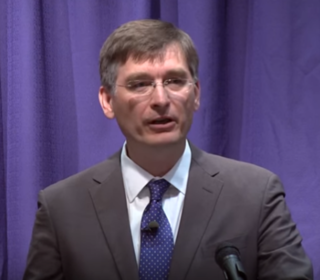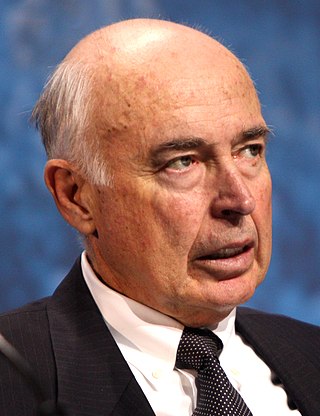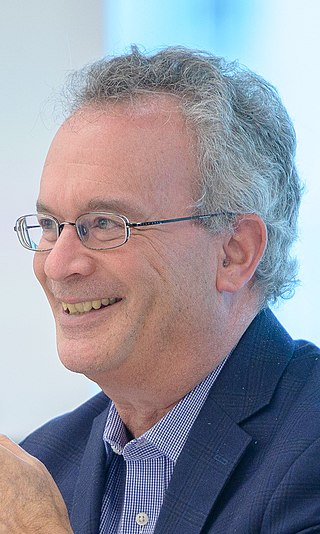
The Hoover Institution is an American public policy think tank which promotes personal and economic liberty, free enterprise, and limited government. While the institution is formally a unit of Stanford University, it maintains an independent board of overseers and relies on its own income and donations. It is widely described as conservative, although its directors have contested the idea that it is partisan.
Nikolas Kirrill Gvosdev is a Russian–American international relations scholar. He is currently professor of national security studies at the U.S. Naval War College and the former Editor of the bi-monthly foreign policy journal, The National Interest. He writes as a specialist on US foreign policy as well as international politics as they affect Russia and its neighbors. He currently serves as editor of the journal Orbis.

The International Association of Genocide Scholars (IAGS) is an international non-partisan organization that seeks to further research and teaching about the nature, causes, and consequences of genocide, including the Armenian genocide, the Holocaust, the genocides in Cambodia, Rwanda, Burundi, Bosnia-Herzogovina, Bangladesh, Sudan, and other nations. The IAGS also advances policy studies on the prevention of genocide. The association's members consider comparative research, case studies, links between genocide and other human rights violations, predictive models for prevention of genocide, and tribunals and courts for the punishment of genocide. The organization's membership includes academics, anti-genocide activists, artists, genocide survivors, journalists, jurists, and public policy makers. Membership is open to interested persons worldwide.
Peter Berkowitz is an American political philosopher and legal scholar. In 2019–2021, he served as the Director of Policy Planning at the United States Department of State. He currently serves as the Tad and Dianne Taube Senior Fellow at the Hoover Institution of Stanford University and as director of studies for The Public Interest Fellowship. He is also a columnist for RealClearPolitics.

Dr. James E. Waller is a widely recognized scholar in the field of Holocaust and genocide studies, and the inaugural Cohen Professor of Holocaust and Genocide Studies at Keene State College located in Keene, New Hampshire.
Joel H. Rosenthal is a scholar, teacher, and executive best known for his work in ethics and international affairs. He is currently president of Carnegie Council for Ethics in International Affairs. He lectures frequently at universities and public venues across the United States and around the world.[1]

Jakub J. Grygiel is an Ordinary Professor of politics at the Catholic University of America and fellow at The Institute for Human Ecology. He is a senior advisor at The Marathon Initiative and a Visiting National Security Fellow at the Hoover Institution. He is also a book review editor for Orbis. In 2017-2018 he was a senior advisor to the Secretary of State in the Office of Policy Planning working on European affairs. Before joining the Department of State, he was George H. W. Bush Associate Professor at The Paul H. Nitze School of Advanced International Studies. Grygiel was a Senior Fellow at the Center for European Policy Analysis.
David Bruce MacDonald is a Canadian political scientist who studies international relations, genocide, and political myths.

Kori N. Schake is an American international relations scholar currently serving as the Director of Foreign and Defense Policy at the American Enterprise Institute. She has held several high positions in the U.S. Defense and State Departments and on the National Security Council. She was a foreign-policy adviser to the McCain-Palin 2008 presidential campaign. Schake is a contributing writer at The Atlantic. She serves on the board of advisors of the Foreign Policy Research Institute and the Alexander Hamilton Society.

Lee Andrew Feinstein is an American policy-scholar, and former diplomat and senior official at the US Departments of State and Defense. Feinstein held senior positions on leading Democratic presidential campaigns in 2008. He served as the United States Ambassador to Poland from 2009 to 2012, appointed by President Obama and unanimously confirmed by the US Senate. Feinstein was the inaugural dean at Indiana University's Lee H. Hamilton and Richard G. Lugar School of Global and International Studies. His nonpartisan scholarship has been recognized by leading Republicans and Democrats.

Melvyn Paul Leffler is an American historian and educator, currently Edward Stettinius Professor of History at the University of Virginia. He is the winner of numerous awards, including the Bancroft Prize for his book A Preponderance of Power: National Security, the Truman Administration and the Cold War, and the American Historical Association’s George Louis Beer Prize for his book For the Soul of Mankind: The United States, the Soviet Union, and the Cold War.
Holocaust studies, or sometimes Holocaust research, is a scholarly discipline that encompasses the historical research and study of the Holocaust. Institutions dedicated to Holocaust research investigate the multidisciplinary and interdisciplinary aspects of Holocaust methodology, demography, sociology, and psychology. It also covers the study of Nazi Germany, World War II, Jewish history, antisemitism, religion, Christian-Jewish relations, Holocaust theology, ethics, social responsibility, and genocide on a global scale. Exploring trauma, memories, and testimonies of the experiences of Holocaust survivors, human rights, international relations, Jewish life, Judaism, and Jewish identity in the post-Holocaust world are also covered in this type of research.

Jessica Eve Stern is an American scholar and academic on terrorism. Stern serves as a research professor at the Pardee School of Global Studies at Boston University. Earlier she had been a lecturer at Harvard University. She serves on the Hoover Institution Task Force on National Security and Law. In 2001, she was featured in Time magazine's series on Innovators. In 2009, she was awarded a Guggenheim Fellowship for her work on trauma and violence. Her book ISIS: The State of Terror (2015), was co-authored with J.M. Berger.

Angelo Maria Codevilla was an American professor of international relations at what is now the Pardee School of Global Studies at Boston University. He served as a U.S. Navy officer, a foreign service officer, and professional staff member of the Select Committee on Intelligence of the United States Senate. Codevilla's books and articles range from French and Italian politics to the thoughts of Machiavelli and Montesquieu to arms control, war, the technology of ballistic missile defenses, and a broad range of international topics. Articles by Codevilla have appeared in Commentary, Foreign Affairs, National Review, and The New Republic. His op-eds have appeared in The New York Times, The Wall Street Journal, The American Spectator and The Washington Post. He has also been published in Political Science Reviewer, Intercollegiate Review, and Politica.

David S. Painter is an associate professor of international history at Georgetown University. He is a leading scholar of the Cold War and United States foreign policy during the 20th century, with particular emphasis on their relation to oil.

James M. Goldgeier is a professor of international relations at the School of International Service at American University in Washington, D.C., where he served as dean from 2011 to 2017.

Kiron Kanina Skinner is an American academic and former government official. She was Director of Policy Planning at the United States Department of State in the Trump administration. Skinner is presently the Taube Professor of International Relations and Politics at the Pepperdine University School of Public Policy, where she teaches graduate courses in national security and public leadership. Prior to that, she was the Taube Professor of International Relations and Politics at Carnegie Mellon University, and the founding director of the Institute for Politics and Strategy and associated centers at the university. She is also the W. Glenn Campbell Research Fellow at the Hoover Institution of Stanford University. After leaving the Department of State, she returned to her position at Carnegie Mellon University until stepping down in 2021.
The Atrocities Prevention Board (APB) is an interagency committee consisting of U.S. officials from the National Security Council, the Departments of State, Defense, Justice, and Treasury, the U.S. Agency for International Development, and the U.S. Intelligence Community. The board meets monthly to assess the long-term risks of atrocities around the world.
Paul Anthony Rahe is an American classicist, historian, writer and professor of history at Hillsdale College. He taught at Yale University, Cornell University, Franklin and Marshall College, and the University of Tulsa before taking up his present position.

"Never again" is a phrase or slogan which is associated with the lessons of the Holocaust and other genocides. The slogan was used by liberated prisoners at Buchenwald concentration camp to denounce fascism. It was popularized by far-right Rabbi Meir Kahane in his 1971 book, Never Again! A Program for Survival.













